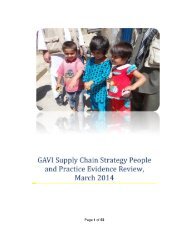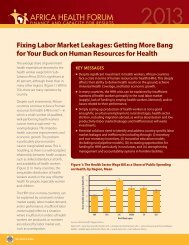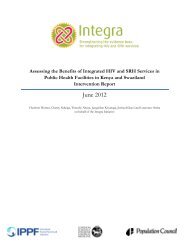ujh78
ujh78
ujh78
Create successful ePaper yourself
Turn your PDF publications into a flip-book with our unique Google optimized e-Paper software.
65% versus living with a female household head: 44%) and Nigeria (30% versus 12%) (see Table 6.2). In<br />
Benin, Cameroon, and Senegal, the percentage of children without a primary or secondary education was<br />
around 10 percentage points higher for children living with a male household head.<br />
Overall, we found that the percentage of children without primary or secondary education was<br />
either not associated with the age of the head of household or was higher for children living with a<br />
household head 50 years or older rather than with a younger household head (see Figure 6.4 and Table<br />
6.2). The percentage of children without a primary or secondary education was at least 5 percentage<br />
points higher for children living with an older head of household in Mali (52% versus 58%), Liberia (52%<br />
versus 58%), Benin (27% versus 34%), and Burkina Faso (62% versus 70%). In 10 countries there was no<br />
association between the age of the household head and differences in the percentage of children without<br />
primary or secondary education: Congo (Brazzaville), Lesotho, Mozambique, Namibia, Rwanda, Sao<br />
Tomé and Príncipe, Senegal, Uganda, Zambia, and Zimbabwe.<br />
Variations during the last 13 years<br />
In every country the percentage of children without a primary or secondary education decreased<br />
during the last 13 years. This decline was most evident—at least six percentage points—in Benin (2001:<br />
36% and 2006: 29%), Mali (2001: 60% and 2006: 54%), Namibia (2000: 15% and 2006-07: 9%), and<br />
Zambia (2001-2: 23% and 2007: 14%) (see Figure 6.5 and Table 6.3).<br />
6.2 Children Not Currently Enrolled in School<br />
The percentage of children not enrolled in school also varied greatly among countries, ranging<br />
from 7% in Kenya to 52% in Burkina Faso (see Maps 6.3 and 6.4). Four of every 10 children in Senegal<br />
were not enrolled in school during the data collection period (see Table 6.1). Approximately one-third of<br />
children were not enrolled in school in Benin and Ethiopia. Overall, the percentage of children not<br />
enrolled in school was higher for children age 13-17 than for their younger counterparts. This difference<br />
rose to over 20 percentage points in Tanzania and Zimbabwe and was more than 30 percentage points in<br />
Madagascar. In 21 countries the percentage of children age 0-17 not enrolled in school at the time of the<br />
study was at least one percentage point higher for females than for males. In five countries this percentage<br />
was at least one percentage point higher for males than females, while in four countries, the percentages<br />
were similar between the sexes.<br />
Sex and geographic disparities<br />
The greatest differences, by child sex, in the percentage of children age 0-17 who were not<br />
enrolled in school occurred in Benin (males: 29% and females: 40%), Chad (51% and 66%), Cote<br />
d’Ivoire (40% and 51%), Guinea (42% and 53%), and Niger (59% and 73%)—all differences of at least<br />
10 percentage points (see Figure 6.6 and Table 6.4).<br />
We found no geographic disparities in Rwanda, Swaziland, and Uganda (see Figure 6.7). In the<br />
rest of the countries, however, the percentage of children who did not enroll in school was at least one<br />
percentage point higher in rural areas than in urban areas. This difference was at least 33 percentage<br />
points higher in Burkina Faso (urban: 25% and rural: 59%), Guinea (23% and 59%), and Niger (37% and<br />
72%) (see Table 6.4). The percentage of children not enrolled in school was also at least 20 percentage<br />
points higher in rural areas than in urban areas in Chad, Ethiopia, Liberia, Mali, Nigeria, Senegal, and<br />
Sierra Leone.<br />
108








